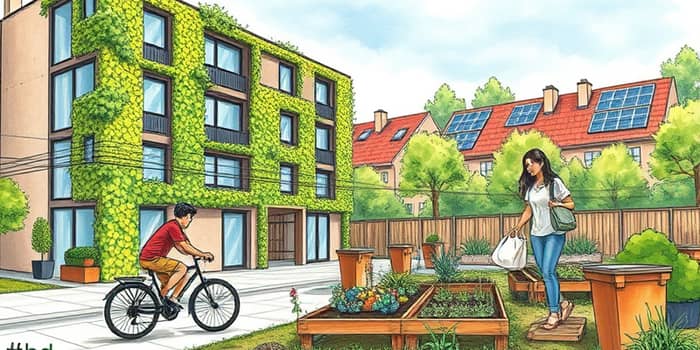In a world driven by instant gratification and relentless efficiency, it’s easy to fall into habits that prioritize speed over care. Yet, as the consequences of climate change intensify, the need to shift our daily practices toward eco-conscious choices has never been more urgent. By building habits that respect our planet and focus on long-term resilience, we can transform routines into powerful tools for environmental and personal well-being.
Why Sustainable Routines Matter
Sustainable living means making conscious choices that reduce negative impacts and ensure resources endure for future generations. Our daily rituals—from how we commute to how we shop—directly affect global emissions, resource depletion, and waste accumulation. While speed-focused routines may offer convenience, they often come at the cost of higher energy consumption, excessive packaging, and increased greenhouse gases.
Fast transportation, single-use products, and “fast fashion” trends contribute to unnecessary waste streams and pollution. Replacing these with mindful alternatives not only lowers our carbon footprint but fosters a deeper connection between our actions and their environmental outcomes. As individuals, our smallest choices can ripple outward into significant collective impact.
Sustainability Trends Shaping Consumer and Business Behavior
Recent data shows a strong global shift toward sustainable products and practices. Consumers are increasingly driven by ethics as much as price, demanding transparency and accountability from brands. Corporations are responding by integrating environmental, social, and governance (ESG) principles into everything from supply chains to marketing strategies.
- 72% of global consumers are willing to pay more for sustainable products
- 78% of US consumers say a sustainable lifestyle is important to them
- 64% of Millennials report that living sustainably brings their family closer together
- 27% of people under 30 frequently buy second-hand items
These statistics illustrate a clear market preference for eco-friendly offerings. Companies that highlight genuine sustainability claims enjoy faster growth, with ESG-focused products seeing 28% cumulative expansion over five years compared with 20% for conventional alternatives.
Benefits of Sustainability-Focused Routines
Embracing greener routines brings benefits that extend beyond carbon reduction. Families who cook meals together using local ingredients often report stronger bonds and healthier habits. Homeowners investing in green building certifications see higher property values, and communities that adopt renewable energy sources lower both emissions and utility bills.
Concrete production alone consumes nearly 10% of global industrial water and contributes to urban heat islands. By contrast, integrating living walls, superior insulation, and LED lighting can dramatically improve energy efficiency and create healthier indoor environments.
Overcoming Barriers and Misconceptions
Despite strong interest, only around 30% of people have made significant lifestyle changes for sustainability. Affordability remains a key barrier, with 49% citing cost concerns. Many still believe that going green always demands greater expense, overlooking the long-term savings and resilience that eco-friendly solutions can deliver.
Education and accessible resources are essential to dispel misconceptions. Highlighting success stories—like neighborhoods that reduced energy bills by collectively installing solar panels—and promoting government incentives for green upgrades can lower entry barriers and inspire wider adoption.
Practical Strategies to Build Sustainable Routines
- Swap single-use items for durable, reusable alternatives, such as stainless steel water bottles and cloth shopping bags.
- Choose second-hand or ethically produced clothing over fast fashion to minimize textile waste.
- Opt for public transit, car-sharing programs, cycling, or walking instead of defaulting to private vehicles.
- Implement energy-saving technologies at home: smart thermostats, LED lighting, improved insulation, and living walls.
- Adopt circular behaviors: repair electronics, recycle materials carefully, and compost organic waste.
- Support companies with transparent, verifiable sustainability commitments and ethical supply chains.
Small adjustments—like setting thermostat schedules or packing lunch in a reusable container—accumulate into significant environmental and financial savings. Corporate examples, such as retailers offering discounts for reusable cups and cities banning lightweight plastic bags, demonstrate how policy and individual choices can reinforce each other.
Systemic and Community Impact
While individual actions matter, collective efforts unlock transformational change. When neighbors form energy cooperatives or local businesses adopt zero-waste policies, they create a supportive ecosystem that amplifies each person’s contribution. This compound impact when individuals act drives market demand and encourages policymakers to accelerate sustainable infrastructure investments.
Integrating sustainability into everyday routines is not just an environmental imperative; it fosters social cohesion, economic resilience, and improved quality of life. By prioritizing mindful habits over speed, we create communities equipped to thrive amid global challenges.
Designing routines around sustainability is more than a trend—it’s a necessary evolution toward a healthier planet and more fulfilling lives. Start by identifying one routine to transform this week: swap your commute for a bike ride, replace disposable items with reusable options, or plant a small living wall at home. Each step, no matter how modest, contributes to a collective wave of change that safeguards our future and enriches our present.
References
- https://www.arbor.eco/blog/sustainability-statistics
- https://www.mckinsey.com/industries/consumer-packaged-goods/our-insights/consumers-care-about-sustainability-and-back-it-up-with-their-wallets
- https://www.unep.org/explore-topics/resource-efficiency/what-we-do/sustainable-lifestyles/why-sustainable-lifestyles
- https://auramodernhome.com/blogs/the-modern/sustainability-stats-every-interior-designer-should-know
- https://www.colorado.edu/ecenter/2022/02/07/future-zero-waste-living-sustainable-architecture
- https://globescan.com/2023/10/26/healthy-and-sustainable-living-report-2023/
- https://www.greenmatch.co.uk/blog/how-to-be-more-eco-friendly
- https://instituteofsustainabilitystudies.com/insights/guides/why-is-sustainable-product-design-and-innovation-important/










